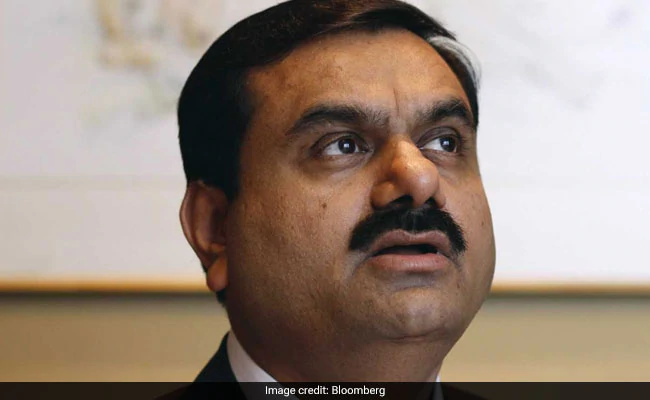Barred Or Not? Adani Investors Fret Over Three Mauritius Funds

[ad_1]
Adani Total Gas, Adani Power, and Adani Transmission fell by 5% daily limit on Tuesday
Confusion over three Mauritius-based funds that whipsawed shares of companies controlled by billionaire Gautam Adani this week has underscored a deeper risk for investors in such stocks owned by opaque entities.
Shares of Adani’s firms nosedived Monday after a local media report said accounts of these funds — owning about $6 billion of shares across the conglomerate — were frozen by the national share depository.
The Economic Times said the action was taken probably due to insufficient information on the owners, citing people it didn’t identify. The stocks recouped losses after the conglomerate refuted it. A Tuesday filing stoked doubts again after Adani group said the three funds were facing some suspension due to a years-old regulatory order.
Adani Total Gas Ltd., Adani Power Ltd. and Adani Transmission Ltd. all fell by their 5% daily limit in Mumbai on Tuesday. Adani Ports & Special Economic Zone Ltd. and Adani Green Energy Ltd. also slipped a little. Flagship Adani Enterprises Ltd. fell initially before reversing the losses to close the day with 2.5% gain.
“It is important for investors and the regulator to be aware of the ownership in listed companies, especially when they originate from tax havens like Mauritius,” said Hemindra Hazari, an independent research analyst in Mumbai. “The names of the funds are not very well known in the capital market and they have high concentration into a select number of stocks, which in itself is unusual.”
Opacity
Even as a massive share rally in the companies of the ports-to-power conglomerate has this year more than doubled the net worth of Adani — a first-generation entrepreneur — to $73 billion, this week’s events have pointed to a deeper pain point: opacity around the group and its key non-founder shareholders. There’s also scant analyst coverage for Adani companies, highlighting the information lacunae could be a chronic issue.
Barring one, all other Adani group stocks fell for a second day in Mumbai. The Economic Times said Monday the National Securities Depository Ltd. froze the accounts of Albula Investment Fund, Cresta Fund and APMS Investment Fund.
The Adani group denied the report and called it “blatantly erroneous” in a statement Monday but clarified on Tuesday that three demat accounts of Cresta, Albula and APMS are “suspended for debit,” adding to the confusion over the status of the offshore funds.
“It is extremely crucial for the Adani Group to disclose relevant details regarding ultimate beneficial ownership of foreign portfolio investors holding substantial shares of its group companies,” said Zulfiquar Memon, managing partner of Mumbai-based law firm MZM Legal LLP. Disclosing these details is necessary “as part of being transparent,” he said.
Some of Adani group’s listed stocks have soared more than sixfold in value since the start of 2020 on bets that Adani’s massive push into infrastructure will pay off as India looks to revive the virus-ravaged economy. Adding to the tailwind was MSCI Inc.’s decision to include three more Adani stocks to its India benchmark index, taking the total to five. That means any fund indexed to this gauge will have to buy into these stocks.
The index providers may reduce the free-float of Adani stocks in their calculation, according to Brian Freitas, a New Zealand-based analyst on independent research provider Smartkarma. This may lead to a selloff of about $515 million worth of shares by passive funds, Freitas said.
“Whenever there is a lack of transparency, it is best for investors to stay away,” Hazari said.
‘Concentrated Positions’
The quick surge in the stocks in the past year combined with equity largely held by overseas funds with very little public float is a risk for Adani shares, Bloomberg Intelligence analysts wrote last week. Among the biggest foreign investors are a few Mauritius-based funds holding over 95% of assets in these companies, Gaurav Patankar and Nitin Chanduka wrote in a June 10 note.
“Such concentrated positions, along with negligible onshore ownership, create asymmetric risk-reward as large investors conspicuously avoid Adani,” the BI analysts said.
But Adani, 58, is known to be a survivor of crises. More than two decades ago, he was kidnapped and held for ransom. In 2008, he was among the hostages at Mumbai’s Taj Mahal Palace hotel during the terror attacksthat killed at least 166 people.
Since then Adani has risen sharply by dovetailing his group’s business priorities with India’s broader development push. And that’s the pivot which has drawn in investors.
Despite the volatility, “the company remains in very good monopoly-like businesses,” said Sanjiv Bhasin, a director at investment management firm IIFL Securities Ltd. in Mumbai. “Volatility is there but underlying fundamentals of the group remain strong. “
(Except for the headline, this story has not been edited by NDTV staff and is published from a syndicated feed.)
[ad_2]
Source link

